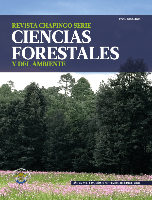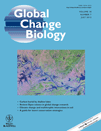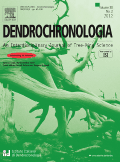
TREE PHYSIOLOGY
Scope & Guideline
Advancing Knowledge in Plant Physiology
Introduction
Aims and Scopes
- Tree Physiology and Growth Dynamics:
Research on the physiological processes that influence tree growth, including studies on the factors affecting photosynthesis, respiration, and nutrient uptake. - Responses to Environmental Stress:
Investigation into how trees respond to various environmental stressors such as drought, salinity, and temperature changes, focusing on adaptive mechanisms and resilience. - Carbon and Nutrient Cycling:
Studies centered on the role of trees in carbon sequestration and nutrient cycling, including the dynamics of non-structural carbohydrates and their impact on tree health. - Tree-Microbe Interactions:
Exploration of the symbiotic and pathogenic relationships between trees and microorganisms, including mycorrhizal associations and responses to pathogens. - Evolutionary and Functional Ecology:
Research that examines the evolutionary adaptations of trees to their environments, including functional trait diversity and ecological implications.
Trending and Emerging
- Climate Change Adaptation:
Increasing emphasis on understanding how trees adapt to climate change, including studies on phenological shifts, drought tolerance, and responses to elevated CO2 levels. - Omics Approaches in Tree Biology:
The application of genomics, transcriptomics, and metabolomics is on the rise, providing deeper insights into the molecular mechanisms underlying tree physiology and stress responses. - Ecosystem Function and Services:
Research exploring the role of trees in ecosystem services, such as carbon sequestration, biodiversity support, and soil health, is gaining increased attention. - Interdisciplinary Research:
There is a trend towards interdisciplinary studies that combine insights from ecology, physiology, molecular biology, and environmental science to address complex questions in tree biology. - Microbiome Research:
Emerging interest in the role of the tree microbiome in health, growth, and stress resilience, highlighting the importance of microbial communities in tree physiology.
Declining or Waning
- Traditional Morphological Studies:
There has been a noticeable decrease in studies that focus solely on morphological characteristics of trees without integrating physiological or ecological perspectives. - Single-Factor Experimental Designs:
Research focusing on isolated variables, such as just drought or nutrient stress, is becoming less common as the field moves towards more integrative approaches that consider multiple interacting factors. - Basic Physiological Measurements:
The focus on fundamental physiological measurements (e.g., simple gas exchange metrics) is waning in favor of more complex analyses that incorporate molecular and genetic data.
Similar Journals

Soil Ecology Letters
Cultivating Knowledge for Ecological ResilienceSoil Ecology Letters, published by SpringerNature, is a premier journal dedicated to advancing the knowledge and understanding of soil ecosystems, their functions, and their vital role in global sustainability. Since its inception in 2019, this leading journal has consistently maintained its prestigious Q1 ranking in Ecology, Evolution, Behavior and Systematics, as well as Soil Science, reflecting its significant impact in the ecological and environmental sciences community. With an impressive Scopus ranking that places it within the top percentile of journals in its field, Soil Ecology Letters provides a platform for researchers and professionals to disseminate their groundbreaking findings. The journal is a vital resource for advancing research in agricultural and biological sciences, offering open access options that promote widespread dissemination of knowledge. With its focus on fostering collaboration and innovation in soil ecology, this journal is essential reading for anyone aiming to deepen their understanding of soil environments and their critical role in ecological health.

JOURNAL OF PLANT RESEARCH
Nurturing Insights for a Greener Future.JOURNAL OF PLANT RESEARCH, published by SPRINGER JAPAN KK, is a leading academic journal that has carved a niche in the field of Plant Science. With its ISSN 0918-9440 and E-ISSN 1618-0860, this journal has been disseminating high-quality research since its inception in 1993 and continues to be essential reading for academics and practitioners alike, aiming to bridge the gap between innovative plant research and practical applications. The journal is highly regarded, holding a prestigious Q1 ranking in Plant Science for 2023, and is positioned in the top 80th percentile within the Scopus rankings for Agricultural and Biological Sciences. The journal's coverage includes a wealth of topics pertinent to advancing our understanding of plant biology, ecology, and sustainable agricultural practices. Although it operates under a subscription model, its influence in the research community remains profound, making it a vital resource for contemporary studies in plant-related disciplines.

Revista Chapingo Serie Ciencias Forestales y del Ambiente
Connecting researchers to preserve our forest ecosystems.Revista Chapingo Serie Ciencias Forestales y del Ambiente, published by Universidad Autónoma Chapingo, serves as a prominent platform for scholars and practitioners in the fields of Ecology and Forestry. Established in 2001, this open access journal has made significant strides in disseminating research that addresses pressing environmental issues, particularly within the Mexican context. With an ISSN of 2007-3828 and E-ISSN of 2007-4018, it has been recognized for its contributions, earning a Q3 ranking in both Ecology and Forestry categories as of 2023. The journal is pivotal in fostering collaboration and knowledge exchange among researchers, professionals, and students dedicated to understanding and preserving forest ecosystems. Access to its rich content is unrestricted, enhancing visibility and impact for innovative research and practical applications in sustainable management and conservation practices.

BALTIC FORESTRY
Innovating Research for Tomorrow's ForestsBALTIC FORESTRY, published by the INST FORESTRY LRCAF in Lithuania, is a prominent academic journal that serves as a platform for disseminating cutting-edge research in the field of forestry. With an ISSN of 1392-1355, this journal is dedicated to advancing knowledge on sustainable forest management, ecological impacts, and resource conservation, among other vital topics. As of 2023, it has been categorized in the Q3 quartile for forestry in Scopus, indicating its solid reputation among peer-reviewed publications, ranking #95 out of 174 in the realm of Agricultural and Biological Sciences. BALTIC FORESTRY features contributions from researchers across the globe and encourages innovative approaches to solving contemporary challenges in forestry, making it an essential resource for professionals, scholars, and students alike. Although it operates under subscription-based access options, the journal's commitment to fostering academic discourse is unwavering, aiming to bridge the gap between theory and practice in forest science.

BOSQUE
Exploring Innovations in Forest ManagementBOSQUE, published by Universidad Austral de Chile, Facultad de Ciencias Forestales, stands as a pivotal platform for advancing the field of forestry and related environmental sciences. With an ISSN of 0717-9200, this journal has been committed to disseminating original research, reviews, and case studies essential for understanding forest ecosystems and management practices since its inception in 2006. As of 2023, it holds a Q3 ranking in the forestry category, showcasing a significant yet developing influence in the broader academic landscape, evidenced by its Scopus ranking placing it at the 12th percentile in Agricultural and Biological Sciences - Forestry. While boasting a diverse range of articles, BOSQUE promotes open access to a growing community of researchers, professionals, and students eager to contribute to sustainable forest management and conservation efforts. The journal continues to foster critical dialogue and innovation, making it an invaluable resource for those dedicated to enhancing forest sciences.

GLOBAL CHANGE BIOLOGY
Advancing Insights into Ecological TransformationsGLOBAL CHANGE BIOLOGY, published by Wiley, is a leading journal dedicated to advancing the scientific understanding of the relationships between biological systems and global environmental changes. With an impressive impact factor placing it in the Q1 category across multiple disciplines—including Ecology, Environmental Chemistry, and Global and Planetary Change—this journal is essential for researchers, professionals, and students aiming to stay at the forefront of this dynamic field. The journal has a rich history since its inception in 1995, continually providing a platform for high-quality research that informs policy and management practices worldwide. Although it is not open access, the journal remains a valuable resource for those committed to exploring the complexities of ecological and environmental change. With a Scopus ranking of #3 in Global and Planetary Change and #6 in both Ecology and Environmental Chemistry, GLOBAL CHANGE BIOLOGY continues to shape the dialogue on the pressing environmental challenges of our time.

Dendrobiology
Advancing knowledge in forestry and plant science.Dendrobiology is a distinguished academic journal published by BOGUCKI WYDAWNICTWO NAUKOWE, focusing on the intricate and essential disciplines of forestry and plant science. Since its inception in 2000, the journal has served as a critical platform for the dissemination of high-quality research, advancing our understanding of dendrology and its vital role in ecosystem management and biodiversity conservation. With impressive rankings in Scopus—placing it in the second quartile for Forestry and third quartile for Plant Science—Dendrobiology is recognized for its impactful contributions to the field, with a focus on innovative methodologies and sustainable practices. Although it currently operates under a conventional publishing model, the journal emphasizes accessibility and engagement, catering to a broad academic audience, including researchers, practitioners, and students who are keen to explore pioneering research and developments. By fostering a collaborative academic dialogue, Dendrobiology aims to bridge theoretical foundations with practical applications, ensuring relevance in today’s rapidly evolving fields.

Comparative Biochemistry and Physiology D-Genomics & Proteomics
Exploring the Molecular Frontier: Bridging Genomic and Proteomic SciencesComparative Biochemistry and Physiology D-Genomics & Proteomics, published by Elsevier Science Inc, is a premier journal in the realm of molecular biology and comparative physiology, with a focus on genomic and proteomic sciences. Recognized for its high-impact contributions, it holds a Q1 ranking in Animal Science and Zoology and was established with the vision of bridging gaps in our understanding of biological systems through experimental and comparative approaches. With an impressive Scopus ranking, this journal not only ranks among the top 12% in Animal Science and Zoology but also demonstrates commendable standings across various categories including Aquatic Science and Molecular Biology. The journal’s commitment to disseminating high-quality research makes it an essential resource for researchers, professionals, and students alike, allowing them to access critical studies that influence advancements in genomics and proteomics. While it operates under a traditional subscription model, its impactful findings are crucial for those aiming to enrich their knowledge and research capabilities in these pivotal scientific fields. Join us in exploring the transformative insights and developments that this esteemed journal has to offer for the study of genomics and proteomics.

Icelandic Agricultural Sciences
Cultivating Knowledge for Sustainable AgricultureIcelandic Agricultural Sciences, published by RANNSOKNASTOFNUN LANDBUNADARINS, serves as a vital platform for the dissemination of research in the field of Agronomy and Crop Science. Established to contribute to the advancement of agricultural knowledge in Iceland and beyond, this journal aims to foster collaboration among researchers, professionals, and students dedicated to sustainable agricultural practices. Despite facing a Q4 category ranking in 2023 and a ranking of #344/406 in Scopus, the journal continues to attract diverse research contributions, especially focusing on unique challenges and innovations pertinent to Icelandic agriculture. The journal operates under a traditional access model, providing an essential resource for those looking to deepen their understanding of agronomic developments and their implications for the agricultural sector. With a commitment to increasing awareness and promoting scientific dialogues, Icelandic Agricultural Sciences plays a crucial role in nurturing the field's growth and enhancing agricultural research.

DENDROCHRONOLOGIA
Advancing Knowledge on Climate and EcologyDendrochronologia is a prestigious journal dedicated to the study of tree rings and their implications for understanding environmental changes, climate variability, and ecological dynamics. Published by Elsevier GmbH in Germany, it has consistently reached high academic standards, holding a remarkable Q1 ranking in both Ecology and Plant Science as of 2023, demonstrating its significant impact within these fields. The journal aims to foster interdisciplinary dialogue through the dissemination of original research, reviews, and methodological advancements related to dendrochronology, appealing to researchers, students, and professionals who seek to deepen their knowledge of the interactions between terrestrial ecosystems and climate change. Although it does not currently offer an open access option, Dendrochronologia remains an essential resource for those in the scientific community, with valuable insights that contribute to the understanding of biodiversity and ecological resilience.